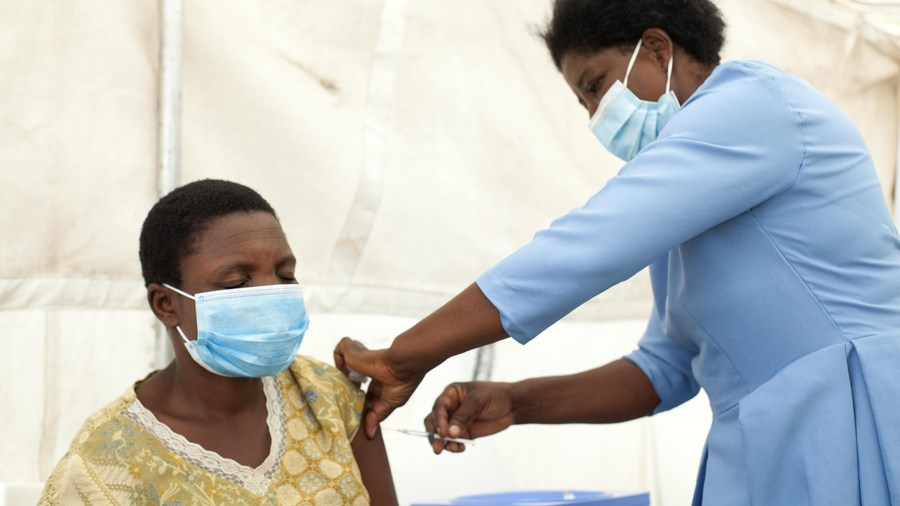Editor's note: Decision Makers is a global platform for influential leaders to share their insights on events shaping today's world. Beth Dunford is vice-president for Agriculture, Human and Social Development at the African Development Bank Group. The article reflects the author's opinions and not necessarily those of CGTN.
In the midst of the COVID-19 pandemic, the world has had to face the question: Are our health systems resilient enough? In Africa, we have been grappling with this dilemma for some time.
The growing disease burden in Africa calls for urgent action to strengthen health infrastructure and enhance its resilience. Consider this – according to the World Health Organization (WHO) and a report in Lancet, Africa's total disease burden is projected to grow by 28 percent over the next decade, with the prevalence of non-communicable diseases increasing to take up the largest share. Furthermore, different African countries have unique disease burden challenges that require different infrastructure. And now pandemics are becoming more prevalent.
Unfortunately, Africa's current health infrastructure is underperforming: 30 percent of the population live more than two hours away from essential services. The WHO says risk of death after surgery in Africa is double the global average. The continent is home to high costs of care due to structural and operational inefficiencies. Africa's average bed density is only 1.3 per 1,000 people, compared to 2.1 in Latin America and 6.1 in Europe. Lastly, COVID-19 exposed Africa's health infrastructure gaps severely compromise its ability to adapt fully and be resilient to shocks.
The shortages highlighted by the pandemic served as a wake-up call to many African governments. But there is only so much they can do if the inequalities fuelled by the pandemic are not addressed. Fiscal constraints have limited the ability of governments to invest in much-needed social programs, and it is likely that rising debts will put further strain on these limited resources.

A woman receives the COVID-19 vaccine at a clinic in Blantyre, Malawi, March 26, 2021. /Xinhua
A woman receives the COVID-19 vaccine at a clinic in Blantyre, Malawi, March 26, 2021. /Xinhua
Last week, the African Development Bank took a bold move in response to the call from its governors for action to address the immediate and long-term healthcare needs of the continent's people. The Bank approved our Strategy for Quality Health Infrastructure in Africa, a blueprint that has the potential to transform health service delivery on the continent by focusing on the three health infrastructure pillars: primary healthcare infrastructure for under-served populations; secondary and tertiary healthcare facilities; and diagnostic infrastructure. It also explores ways to improve health service delivery innovation, like tele-medicine.
Through the strategy, the bank is drawing on its comparative advantage as Africa's second-largest contributor to infrastructure investment. We are encouraged by the support for the strategy that we are receiving from our member countries, development partners and the private sector.
Africa faces a $21.5 billion health infrastructure financing gap per year. Properly targeted investments coming out of the bank's health strategy, and working in partnership with others, will significantly reduce the financing gap and transform the quality of African lives at scale.
The strategy emphasises strong health infrastructure as fundamental to equitable access to quality healthcare and necessary for delivering quality services. Health infrastructure will have a positive economic impact; high-performing facilities contribute to Africa's economic growth by improving workforce productivity. Resilient and agile infrastructure will also insure against economic shocks caused by disease outbreaks and be instrumental in promoting skills development and job creation.
The strategy also addresses policy reforms to increase health coverage, which we know is a key tool for promoting inclusive access to health services. In most African countries, however, poor and marginalized groups are often excluded from health insurance schemes.
The pandemic has shown, yet again, the resourcefulness of Africa's governments, scientists, health workers, entrepreneurs and its people, who responded in unison to the crisis as part of its health agenda, the African Development Bank launched a multibillion dollar COVID-19 Response Facility to support its regional members through the pandemic. We have also committed to investing $3 billion in Africa's pharmaceutical industry over 10 years. Empowered by our Strategy for Quality Health Infrastructure in Africa, the African Development Bank stands ready to help guide the continent on the path to equitable access to quality healthcare.
(If you want to contribute and have specific expertise, please contact us at opinions@cgtn.com.)

